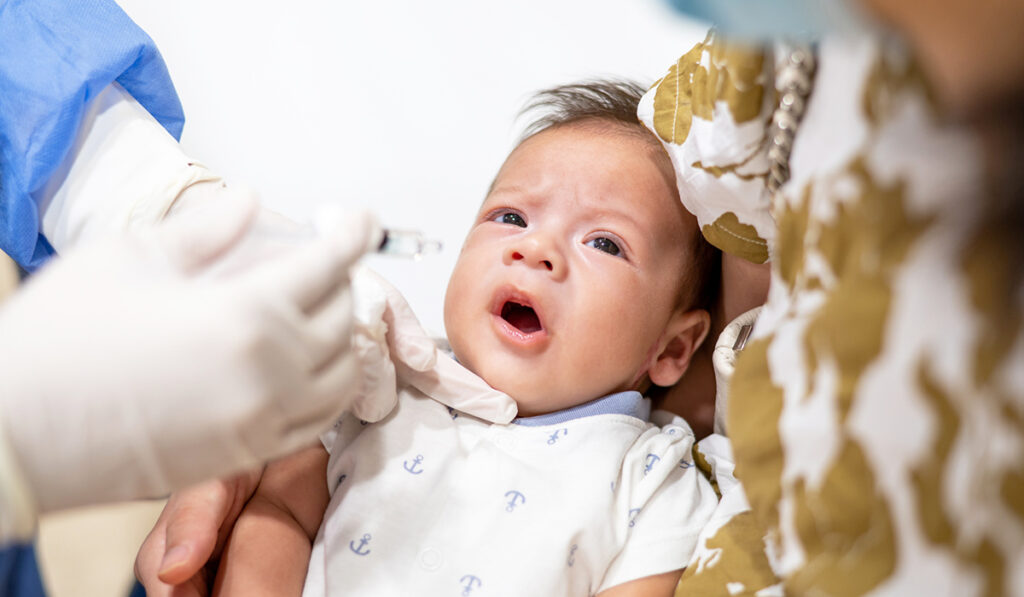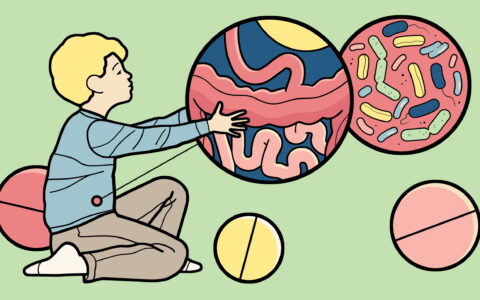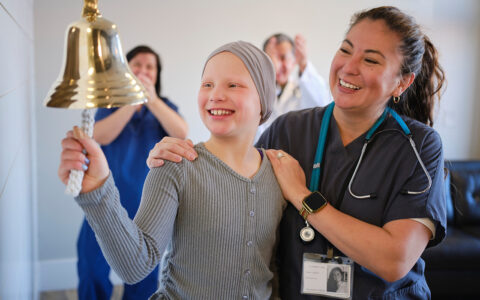Infants in the United States are routinely vaccinated against rotavirus, a highly contagious disease that kills 250,000 children globally each year, with symptoms that include severe diarrhea and vomiting.
Yet, while rotavirus continually evolves through small and large shifts in antigenic makeup, the nearly two-decade-old vaccines remain the same, prompting concern about their ongoing effectiveness.
Kristen Ogden, Ph.D., assistant professor of pediatrics at Vanderbilt University Medical Center, has been developing strategies to monitor the rapidly evolving virus and develop more effective vaccines.
“We’re interested in how these viruses acquire genetic diversity,” she explained.
The focus of Ogden’s studies are the outer capsid proteins that surround rotavirus. She says a better understanding of these proteins, and how they change, could yield new information about immune responses to the virus.
Protein-Derived Immunogenicity
“The outer capsid proteins VP7 and VP4 are primary targets of neutralizing antibodies and important components of rotavirus vaccines,” Ogden said.
These proteins are also what defines a strain’s serotype, termed its G-type (VP7) or P-type (VP4). While VP7 is the major outer capsid glycoprotein, VP4 is used for attachment.
“It’s a critical determinant of the types of cells that rotavirus can infect,” Ogden said.
Studying the proteins hasn’t been easy. Human rotaviruses replicate poorly in laboratory environments, which has been an impediment to research and vaccine development.
Despite these challenges, there are two live oral vaccines commercially available in the United States, ROTARIX and RotaTeq. Introduced in 2005 and 2006, respectively, neither has ever been updated.
ROTARIX is a single attenuated human rotavirus strain. RotaTeq is comprised of 10 bovine rotavirus RNAs plus a single human VP4 or VP7 protein. These vaccines do not encompass the diversity of outer capsid proteins in circulation, Ogden says.
“Both vaccines exhibit really high efficacy against severe disease in low-mortality, high-income countries. Unfortunately, efficacy is not so high in the high-mortality, low- and middle-income countries where they are most needed.”
Reverse Engineering New Strains
One contributing factor, Ogden says, may be the rotavirus outer capsid protein variation. Her laboratory has been developing new strategies to study these key proteins for more insight.
Ogden’s team takes advantage of reverse genetics technology to create recombinant rotaviruses. The researchers transfect cells with plasmids containing rotavirus RNAs of interest, overcoming challenges of the past.
“There is potential to use this reverse genetics system as a vaccine development platform.”
They have generated multiple recombinant rotavirus strains. The strains draw RNA from biological samples collected from infected patients, as well as from each vaccine. The result is a panel of recombinant rotaviruses that each express one specific, human, outer capsid protein, either VP7 or VP4.
“Recovery of these rotaviruses containing a human VP4 or VP7 protein was very exciting,” Ogden said. “There is potential to use this reverse genetics system as a vaccine development platform. It also allows us to directly compare the functions between human VP7 proteins, and potentially VP4 proteins.”
Testing Immunogenicity
With recombinant viruses in hand, Ogden’s team tested how well each outer capsid protein triggers an immune response – a critical step in developing effective vaccines.
The researchers exposed their rotavirus panel to serum donated by infants who had received either ROTARIX or RotaTeq vaccines and, therefore, had antibodies to the virus. This allowed Ogden’s team to directly compare the antigenic properties of each rotavirus protein.
Results showed that the multivalent vaccine, RotaTeq, elicits a broader immune reaction than the monovalent option, ROTARIX.
“Infants immunized with Rotateq developed a really broad VP7-specific response. Basically, every G-type was neutralized by sera from these infants, including G-types not present in the vaccine,” Ogden said.
The finding suggests that including multiple VP7 proteins in a rotavirus vaccine is likely to cover the most strains. Ogden and colleagues published the study in the Journal of Infectious Diseases.
Zeroing In: Protein Diversity
Another key area of research for Ogden is determining exactly how human rotavirus acquires the ability to replicate so efficiently in cells. Recent experiments have begun to provide answers.
Ogden and colleagues started with stool samples containing human rotavirus. They allowed these viruses to replicate for 15 generations in monkey kidney cells – the traditional laboratory host for rotavirus. Any rotavirus that remained after this process, the researcher surmised, must have genetic variations (polymorphisms) that contributed to their survival. The team then performed next-generation sequencing to find them.
“We identified hundreds of polymorphisms. The majority were found in VP4,” she said.
The researchers identified 13 such variants across all the rotavirus samples. An additional 28 were conserved in all P8 serotypes. Now, Ogden’s team is using a strategy they previously validated to create recombinant rotaviruses that contain the most common variants. Their goal is to understand the functional contributions of each.
“We want to learn more about the mechanisms of rotavirus cell adaptation,” Ogden said. “We may be able to identify sets of polymorphisms that promote efficient rotavirus replication in culture.”
The approach could propel rotavirus vaccine development, Ogden says.
“We can use this information to rationally design vaccine candidates using sequences of rotavirus proteins from viruses sequenced anywhere in the world, from any country. We can use these to design vaccines that offer more breadth and specificity of protection.”
Ogden presented her work at the 2022 meeting of the Pediatric Academic Societies.






